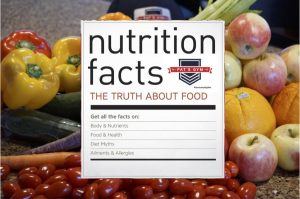 1. Stay away from added sugar
1. Stay away from added sugar
You get enough sugar in your diet through natural sources, so stay away from sugar that is added to foods. Generally, processed foods will have sugar added to them to make them taste better. Common types of added sugars are table sugar (or sucrose), fructose corn syrup and the like.
A lot is being written about how bad processed sugars are for you. Previously, the thought behind sugars is that they were simply “dead” calories. However, there is more research today that shows that it increases the risks of fatal diseases. In addition, sugars are factors in obesity, heart disease and type 2 diabetes. High intake of sugars can cause non-alcoholic fatty liver disease, insulin resistance, elevated triglycerides, abdominal obesity and high cholesterol.
So, stay away from sugar, including sugars in soda and alcohol.
2. Eat more fish, grass-fed meals and enriched eggs for more Omega-3 Fats
Today, low Omega-3’s are common in society. Low Omega-3’s are associated with lower IQ’s, depression, various mental disorders, heart disease and many other serious diseases. Also, Omega-3’s can help control elevated triglycerides.
A great way to get Omega-3 fats is by eating fatty fish, such as salmon. Also, grass-fed beef is a great source of Omega-3’s. Also, eggs high in Omega-3’s are a great source. You can also try supplements.
3. Don’t follow diets blindly
People are unique, and physical reactions to diets vary from person-to-person. Genetics, body type, physical activity and the environment can affect which type of diet you should follow. Be knowledgeable and it will involve a little experimentation.
4. Not all Fats are bad
Trans fats are definitely bad. Trans fats are formed as a side product when vegetable oils are hydrogenated. Trans fats have been linked with poor health and chronic diseases such as inflammation and heart disease.
5. Vegetables are always a safe choice
Vegetables are good for you. They are rich in vitamins, minerals, fiber, antioxidants and an endless variety of trace nutrients that science has just begun to uncover. Various studies show that eating vegetables is associated with improved health and a lower risk of disease. Definitely vary your vegetables, stay with low glycemic, and definitely mix up the colors as different colors will have different minerals, vitamins and micronutrients.
6. Watch out for Vitamin D Deficiency
Vitamin D is a unique vitamin that actually functions as a hormone in the body.
The skin makes vitamin D when it is exposed to ultraviolet rays from the sun. This is how people got most of their daily requirement throughout evolution. However, a large part of the world is deficient in this critical nutrient today.
In many places, the sun simply isn’t available throughout most of the year, or we tend to now avoid the sun because of various skin cancers. Also, sunscreen effectively blocks vitamin D generation in the skin.
If you’re deficient in vitamin D, then you’re actually lacking a major hormone in the body. Deficiency is associated with many serious diseases, including diabetes, cancer, osteoporosis and others.
Unfortunately, it may be difficult to get enough vitamin D from the diet. If getting more sun is not an option, take a vitamin D3 supplement.
7. Always stay away from refined carbs
Generally, everyone agrees that refined carbs are not good for you. Also, they also believe that refined carbs are not as healthy as unrefined carbohydrates. Unrefined carbs are basically whole foods that are rich in carbs. These include whole-grain cereals, beans, vegetables and fruits. Refined carbs, on the other hand, are sugars and refined flour.
Whole foods contain numerous beneficial nutrients and antioxidants. However, when high-carb foods such as grains are processed, the most nutritious parts are stripped off. What is left are massive amounts of easily digestible starch. Those who base their diets on refined carbs may be lacking in fiber and many other healthy nutrients. As a result, they are at an increased risk of chronic disease.
Eating refined carbs will also cause rapid spikes in blood sugar. While high blood sugar levels are unhealthy for all people, they are a much greater concern in people with diabetes.
8. Supplements are okay, but they can’t replace real foods
Vitamins and miners that come from foods are generally better than taking a multivitamin. Supplements cannot match the variety of nutrients you get from real foods. At times you may need to take supplements, but don’t consider it a substitution for the real food.
Supplements have their place, as when you deficient in a vitamin or mineral. But, don’t consider it a substitution. No amount of supplements will make up for a bad diet.
9. Consider a diet as a temporary fix
A diet generally provides short-term results. Generally, once the diet ends, the weight will come back. Therefore, making a lifestyle choice is always smarter than going on a diet. Studies show that most people who lose a lot of weight on a diet end up gaining it back whenever they “stop” the diet. For this reason, the only thing that can give you actual long-term results is to adopt a lifestyle change.
10. Stay away from processed foods
Processed food is generally not as healthy as whole food. As the food system has become more industrialized, the health of the population has deteriorated.
During food processing, many of the beneficial nutrients in the food are removed. Not only do food producers remove healthy nutrients like fiber, but they also add other potentially harmful ingredients like added sugar and trans fats.
Additionally, processed foods are loaded with all sorts of artificial chemicals, some of which have a questionable safety profile. Basically, processed foods have less of the good stuff and a lot more of the bad stuff.
